Winter Safety Guide
Everyone understands how disruptive winter weather can be, but blizzards and intense cold can also be dangerous and even deadly. According to government data, winter weather caused 4,619 injuries and 1,340 deaths between 2014 and 2023. Last year alone, 330 injuries and 56 deaths were related to winter weather.
Properly preparing for winter can be the difference between life and death in certain situations. Richmond Vona cares about protecting our community, so we created this Winter safety guide to help you stay safe, warm, and comfortable while enjoying the season.
Read on to learn our top tips for safely surviving winter weather, including storms and blizzards. In addition, get advice for properly winterizing your home and vehicles.
SAFETY TIPS
- Use Space Heaters, Generators, and Other Appliances Properly
- Know the Signs of Carbon Monoxide Poisoning and Make Sure Your Testers Are Working
- Monitor the Weather and Bundle Up
- Store Drinking Water Before You Need It
- Create Emergency Kits
- Learn Signs of Hypothermia and Frostbite
- Be Prepared for Power Outages
- Know What Different Weather Storm Forecasts Mean For You and Your Family
- Stay Connected
- Keep Your Household Warm, Safe, and Fed
TOP 10 WINTER SAFETY TIPS
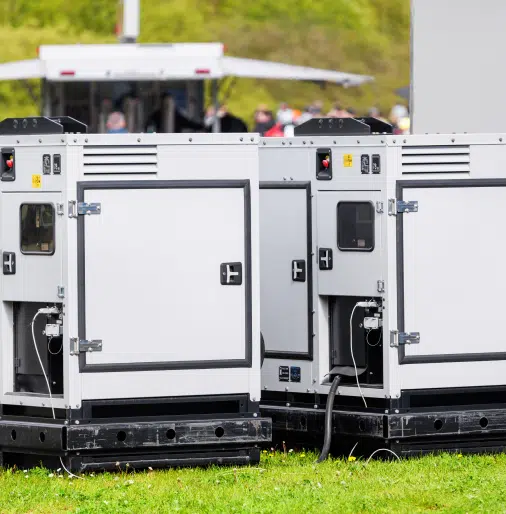
Use Space Heaters, Generators, and Other Appliances Properly
Generators and space heaters can be invaluable resources for keeping warm when your home loses power. However, when used improperly, such equipment can become fire hazards or introduce toxic fumes into your home. Carefully follow the manufacturer’s instructions for any appliance you use.
Do not use any gas-powered appliances inside your home or near windows. Your generator should be placed outside—away from any entrances or vents—and in a dry place where rain or snow won’t affect it. Do not use a generator if it gets wet. Keep gasoline stored away from flames or heat sources.
If you’re using space heaters, make sure they are electric-powered and have automatic shut-offs. Keep them away from flammable items such as blankets. Never cover them with any material. Avoid using extension cords with space heaters, and ensure the main cord is undamaged, does not create a tripping hazard and is not covered.
Know the Signs of Carbon Monoxide Poisoning and Make Sure Your Testers Are Working
Carbon monoxide is odorless, colorless, and deadly. Improper use of generators or other gas-powered appliances can introduce the gas into your home, potentially threatening your family’s safety. Never use a gas stove or oven to heat your house or run your car in a closed garage because it can introduce fumes.
Each level of your home should have carbon monoxide detectors. Regularly check that your detectors are working and replace their batteries twice a year because they can save your life if you experience a gas leak.
Common signs of carbon monoxide poisoning can be mistaken for flu-like symptoms, such as dizziness, vomiting, confusion, and chest pain. Call 911 immediately if you believe you’re experiencing carbon monoxide poisoning.
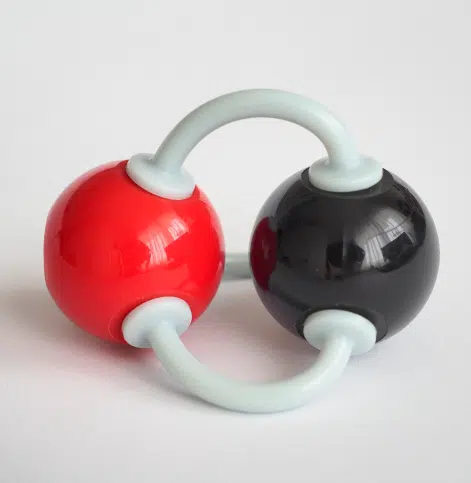
Monitor the Weather and Bundle Up
If you need to leave your home during a nasty winter storm, dress appropriately for the weather. Wearing at least three layers of loose-fitting clothing can create vital insulation to protect you from the cold. Tighter-fitting clothing could keep warm blood from properly circulating to your arms and legs.
Your outer layer should have some wind and rain protection material. Silk, wool, thermal wear, and similar materials work well for your inner layers. It’s vital to stay dry and even remove layers if you start sweating because wet clothing can cause you to quickly lose body heat.
Other accessories are also vital. Wear a hat that covers your ears because much of your body heat escapes through your head. Put on insulated gloves, boots, and a mask or scarf if you need a face covering. If you start shivering, it can be a sign that you’re losing too much body heat, and should head indoors if possible.
Store Drinking Water Before You Need It
Stocking up on water bottles can help you avoid taking drastic or inconvenient measures to stay hydrated during extreme cold.
If your pipes freeze, use an electric hair dryer instead of a torch to thaw them. If they break or stay frozen, and you have no bottled water or cannot borrow any from a neighbor, you can boil snow to use in an emergency. Snow, however, may contain certain chemicals even when it’s boiled.
Create Emergency Kits
Water isn’t the only thing you should keep in case of emergency. Building kits of food, water, medication, batteries, clothing, blankets, and other supplies can save time and stress in a less-than-ideal situation.
The Red Cross recommends keeping a “Go-Kit” of at least three days’ worth of supplies in case your home loses heat or is otherwise unsafe. You should also keep at least two weeks’ worth of supplies in a kit for at-home emergencies.
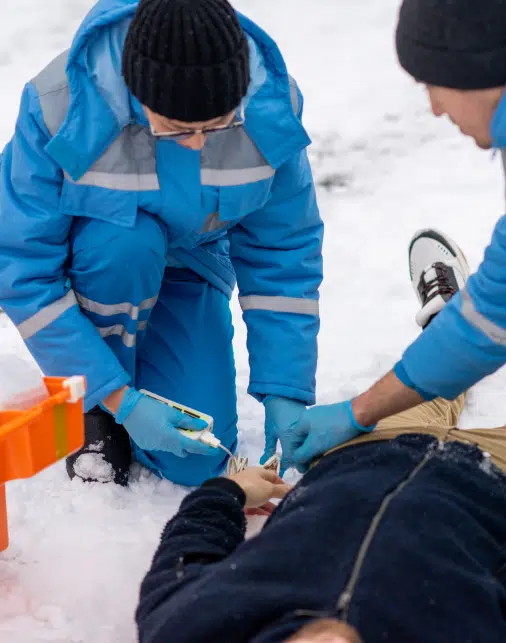
Learn Signs of Hypothermia and Frostbite
Frostbite and hypothermia are conditions caused by cold winter weather that can both become dangerous if untreated. Learn how to spot these conditions and respond to them immediately.
Frostbite occurs when a specific body part begins to freeze. Symptoms include numbness and red, white, or off-color skin that feels waxy. To treat frostbite, move to a warm place immediately and use comfortably warm water on the affected area. Seek medical attention promptly and avoid rubbing or directly exposing the affected areas to most heat sources, which can cause further damage.
Hypothermia can develop when a person’s body temperature lowers to dangerous levels. The condition can affect brain function, making it harder to take action once it sets in. Symptoms include shivering, numbness, and exhaustion. Hypothermia can quickly become dangerous, so move the affected person to a warm, dry place and seek medical attention immediately.
Knowing CPR and making a plan in the event your house loses heat can help you stay prepared against frostbite and hypothermia.
Be Prepared for Power Outages
If a winter storm knocks out power to your home, the outage can last for days, threatening your perishable food and supplies.
Keep flashlights and non-perishable food items in your emergency kits. Having coolers, ice, and a digital thermometer on hand can help you preserve food and determine whether it has remained fresh.
It’s important to turn off or unplug unnecessary appliances or sensitive electronics, which may be damaged by a power surge once electricity is restored. Keep at least one light on so you’ll know when the power returns. If you’re using a generator, operate it safely and follow the manufacturer’s instructions.
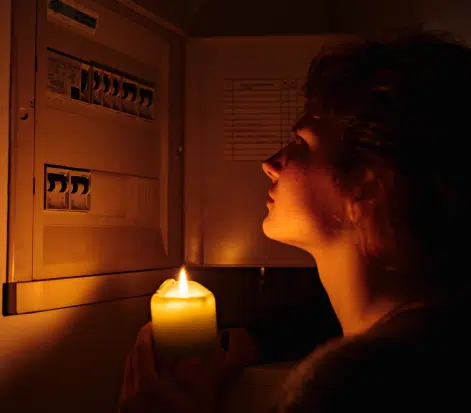
Know What Different Weather Storm Forecasts Mean For You and Your Family
Monitoring emergency broadcasts can help you know what types of weather you’re up against. A “winter storm warning” likely heeds severe and dangerous temperatures, so get ready to remain indoors within 24 hours. A “blizzard warning” heralds severe winds and heavy snow, which means you should avoid traveling in the near future.
Words such as “outlook,” “advisory,” and “watch” can suggest possible weather events worth tracking, according to the Red Cross. Broadcasts can also warn viewers of the current wind chill temperature, which will more accurately reflect how the weather outside feels compared to the actual temperature.
9
Stay Connected
Signing up for your local government’s emergency alert system can make it easier to follow storm warnings and prepare accordingly.
It’s also important to stay in touch with your neighbors, relatives, or anyone else nearby who may be vulnerable to severe weather, especially older adults and those with infants. Check-in on your loved ones and create a plan to keep everyone safe in an emergency.
Keeping backup batteries and phone chargers is invaluable for maintaining contact during a power outage. A battery-powered or hand-crank radio can also help you follow emergency broadcasts without relying on the internet.

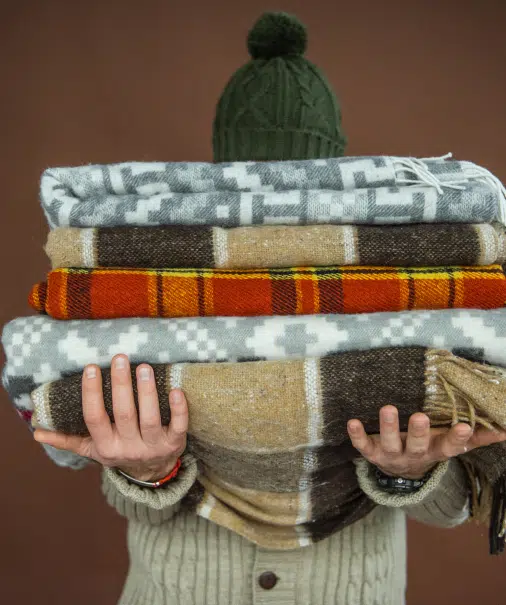
Keep Your Household Warm, Safe, and Fed
To prepare for losing heat, gather extra blankets, warm clothing, and firewood if you can use it. If you have vital medications, do your best to stockpile one to two months’ worth in case you cannot refill your prescriptions. Keep non-perishable, calorically dense food items and serve them warm. Alcohol and caffeine can make you lose body heat faster, so avoid them if possible.
If you’re caring for an infant, avoid giving them pillows or soft bedding as a precaution against smothering. You can warm them with your body heat in an emergency, but the safest thing to do is stay in a warm home and move to another warm place if your house loses heat.
Older adults have lower body heat and should carefully monitor their home temperature. Check-in often on older loved ones and neighbors to ensure they stay warm.
If you’re cold, your pets certainly are. Make sure they stay inside during winter weather.
WINTERIZATION TIPS
Preparing for winter’s effects on your home and vehicles will save you time, stress, and money while keeping you safe. Plan ahead and take proactive steps to prepare your property and vehicles for the cold.
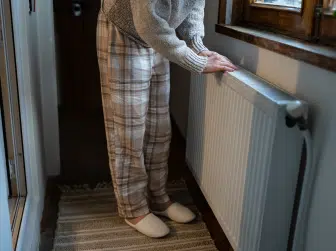
WINTERIZING YOUR HOME
Keeping the cold out and the heat in will save you money and keep your house warmer for longer in an emergency. Consider getting new insulation, caulking your windows, and using other weatherproofing tactics.
Before a cold front, take steps to prevent your pipes from freezing and potentially bursting. Leave your water taps slightly open, keep your home’s interior heated, and leave cabinets open to expose your pipes to warm air.

CAR WINTER PREPARATION
Preventative maintenance and preparation can keep your car comfortable and safe during the winter. Check your antifreeze levels and add winter windshield wiper fluid. Look into installing winter tires and make sure to refill the air in them once temperatures drop. Keeping your gas tank full can prevent ice from forming in your car.
A windshield scraper is a critical tool that should always be in your car during the winter. Build a kit with emergency items to keep in your car, including extra warm clothing and blankets, a first aid kit, and water. Cat litter can help create traction when your car is stuck in snow or ice.
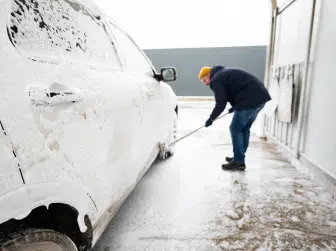
TRUCK WINTER PREPARATION
Many of the same tips for winterizing a car also apply to a pickup truck, but there are other considerations, given the differences between vehicles.
Install some type of protective lining in your truck bed, both to protect from rust and help keep your balance while working in poor weather conditions. Using weights in your truck bed to press down your rear wheels can help a two-wheel drive truck maintain traction in winter weather.
If you use diesel fuel in your truck, make sure it has enough additives to prevent it from solidifying, which will stop your engine from running. If necessary, you can buy your own winterization additives for diesel fuel.
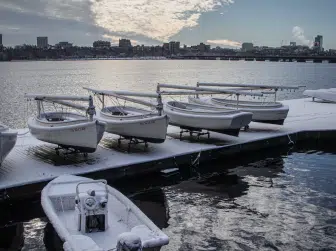
BOAT & RV WINTER PREPARATION
Most boat owners will store their boats out of the water during the winter. However, there are many tasks you’ll need to do first to prevent damage—including properly preparing the boat’s motor, fuel systems, and water systems. A marina technician can handle most of the necessary winter maintenance for you.
While it’s also possible to leave your boat in the water during the cold months, doing so will require much preparation and frequent maintenance to ensure your boat isn’t damaged. The larger your boat and the more amenities it includes, the more work you’ll have to do to avoid freezing damage.
Before living or traveling in an RV during the winter, treat it like your home: Make sure your RV is adequately insulated and weatherproofed to retain heat. You can also purchase skirting material to act as a barrier between the ground and the RV. Ensure you have easy access to heating materials such as propane, and use indoor heaters safely.
Monitor forecasts in case an approaching storm is severe enough to consider moving to a new location. Keep emergency supplies handy if you need to hunker down. If you’re about to endure intense storms, have your RV face the winds, if possible, to minimize any damage.
IF YOU'RE STRUGGLING TO PREPARE FOR THE UPCOMING HARSH WINTER, CONTACT US TODAY
We live and work in the greater Buffalo, New York area, so we know a thing or two about handling winter weather. If you’re dealing with issues while preparing for winter, we’re ready to help. Contact us online today to schedule a free consultation.